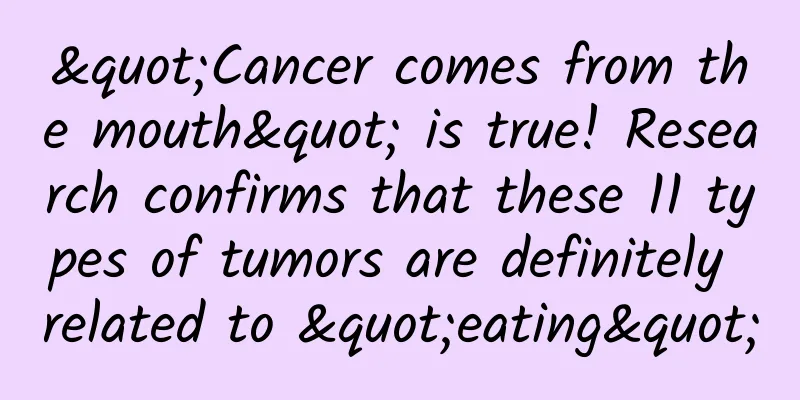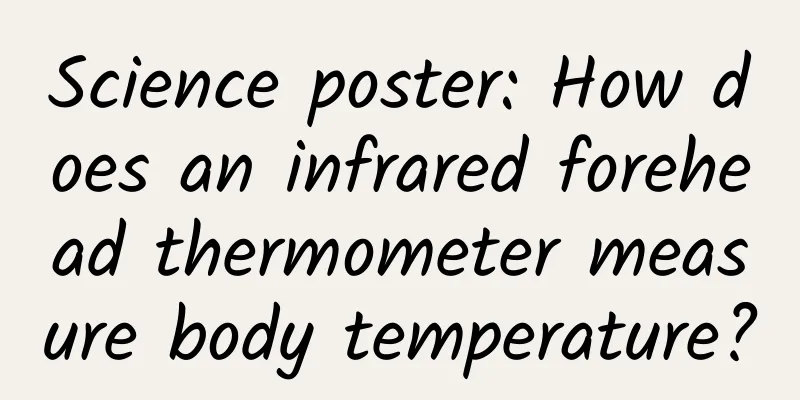"Cancer comes from the mouth" is true! Research confirms that these 11 types of tumors are definitely related to "eating"

|
The word "cancer" has three characters. How much is the relationship between cancer and diet? The report "Diet, Nutrition, Physical Activity and Cancer: A Global Perspective (3rd Edition)" (updated every 10 years) released by the World Cancer Research Fund points out that an unhealthy diet increases the risk of many cancers. A study published in the international medical journal Nature Communications conducted a systematic review of 860 observational studies involved in the report and concluded: There is a clear association between food or nutrient intake and the risk of incidence or mortality from 11 primary malignant tumors , providing strong evidence for the relationship between diet and cancer risk. What dietary habits are the "accomplices" of cancer? What kind of diet can prevent cancer? 01 "Cancer enters the body through the mouth" has solid scientific evidence Researchers from the World Health Organization's International Agency for Research on Cancer and Imperial College London in the United Kingdom found in a meta-analysis: Overall, diet and nutrition may account for 20% to 25% of the global cancer burden . Of this, about 10% to 15% is attributed to obesity factors caused by a high-calorie diet and lack of physical activity; about 5% is attributed to alcohol, and about 5% is attributed to specific dietary factors such as red meat and processed meat. (Click to enlarge the image) Pork, beef and other foods often appear in our daily diet, so the statement that "red meat causes cancer" may cause fear and anxiety among many people. But in fact, meat, especially red meat itself, is not carcinogenic. An important premise of this statement is long-term and large-scale consumption and improper cooking methods. For example, frying, deep-frying, and grilling meat will produce some carcinogens, which can induce cancer. "Food is neither good nor bad, but too much of it can be disastrous. If you don't eat too much every day and try to avoid frying, deep-frying, smoking, or grilling, you don't have to worry about cancer." Copyright image, no permission to reprint Moreover, compared with people in European and American countries, the average intake of red meat and processed meat by the Chinese population is relatively low. Cancer is a disease that is not caused by a single factor. In addition to diet, genetics and environmental characteristics (exposure to toxic substances or hormone disorders, etc.) are all important factors . The report mentioned that the intake of milk, dairy products and calcium is negatively correlated with the risk of cancer. Relevant experts believe that the anti-cancer effect of milk and dairy products is mainly due to the calcium in them: 1. Calcium can bind free bile acids and free fatty acids to reduce their toxic effects on the colorectum; 2. It can also reduce the spread of cancer cells and promote cell differentiation by affecting different cell signaling pathways. In addition to calcium, lactic acid bacteria in dairy products are also beneficial for preventing colorectal cancer; casein and lactose may increase the bioavailability of calcium. Copyright image, no permission to reprint 02 5 bad diets are the "accomplices" of cancer In fact, research on diet and cancer has been one of the hot topics in the field of epidemiology in recent years. In addition to the latest research evidence, there are 5 types of bad diet that are recognized as cancer-causing "accomplices": Fried and smoked foods When food is repeatedly fried or smoked at high temperatures, especially burnt food, it will produce a large amount of carcinogens. Starchy foods, such as French fries, are prone to produce carcinogens such as acrylamide and polycyclic aromatic hydrocarbons when cooked at a high temperature of 120°C . Grilled fish, meat and sausages cooked over open flames or charcoal contain high levels of benzopyrene , which can induce cell mutations and cause cancer. Copyright image, no permission to reprint Repeated high-temperature heating of cooking oil will cause fatty acids to oxidize, crack, and polymerize, producing more carcinogens, including polychlorinated biphenyls, malondialdehyde, etc. Cured and processed meats Many studies at home and abroad have shown that eating large amounts of pickled foods or processed meats, such as salted fish, sausages, bacon, and bacon, increases the risk of gastric cancer . Researchers believe that the nitrite contained in pickled foods will turn into nitrosamines after entering the human body. This is a strong carcinogen that will increase the risk of cancer in digestive organs such as the stomach, intestines, and pancreas. In addition, some pickled foods are high in salt, which may increase the risk of Helicobacter pylori infection and induce gastric cancer . Due to the high temperature and high salt content of processed meat, consumers increase their intake of carcinogens such as heterocyclic amines, polycyclic aromatic hydrocarbons, and N-nitro compounds. Hot food, hot drinks The World Health Organization's International Agency for Research on Cancer classifies hot drinks above 65°C (such as coffee, tea, etc.) as Class 2A carcinogens , saying they increase the risk of esophageal cancer. Epidemiological surveys suggest that esophageal cancer, cardia cancer, oral cancer, etc. in some areas may be related to the habit of eating hot food. Eating hot food for a long time will cause repeated damage to the digestive tract mucosa, which may cause chronic inflammation and promote tumor occurrence. Copyright image, no permission to reprint Studies have found that the most suitable food temperature for the human body is 10℃~40℃ , and the highest temperature that can be tolerated is 50℃~60℃. Moldy and spoiled food When food goes moldy, not only does it deteriorate in sensory quality, it also produces very strong toxins, which can cause food poisoning, illness, or cancer. Aflatoxin is a metabolite of Aspergillus flavus, commonly found in moldy nuts, grains and fermented foods. It is a carcinogen that cannot be killed even at 100°C for 20 hours. It is extremely stable. Long-term and continuous intake of trace amounts of food containing aflatoxin is considered to be an important cause of diseases such as liver cancer, stomach cancer, and intestinal cancer. Surveys and studies in Africa, Southeast Asia and other regions or countries have shown that the incidence of liver cancer is very high wherever food is seriously contaminated with aflatoxin. Alcohol In addition to damaging the liver, there is growing evidence that alcoholic beverages increase the risk of several cancers. Among them, there is sufficient evidence to suggest that alcoholic beverages are one of the causes of oral cancer, laryngeal cancer, esophageal cancer (squamous cell carcinoma), liver cancer, colorectal cancer, and breast cancer . Copyright image, no permission to reprint The association between alcohol and the risk of multiple cancers may be related to multiple mechanisms: Evidence shows that active metabolites of alcohol (such as acetaldehyde) are carcinogenic; alcohol can act as a solvent to promote the entry of carcinogens into cells; drinking large amounts of alcohol may lead to a lack of certain nutrients in the diet, making tissues more sensitive to carcinogenic effects, etc. 03 What kind of diet can prevent cancer? There is no specific and accurate single food for cancer prevention, but there are dietary rules to follow. On the basis of maintaining your own eating habits and hobbies, you can try to do the following 4 points. 1) There are trade-offs in daily diet Take: Consciously increase the intake of protein (eggs, milk, fish, meat, beans) and vegetables; use more cooking methods such as steaming, boiling, and simmering. Shelves: Reduce the intake of red meat and processed meat, and try to avoid frying, stir-frying, and especially roasting; reduce carbohydrates with high glycemic load, such as alcohol, refined sugar, refined rice and flour and their products; avoid or limit drinking. 2) Eat a diverse and balanced diet Food diversity determines the diversity of intestinal bacteria, which in turn determines the health of the human body; it is necessary to ensure a variety of foods every day - fruits, vegetables, whole grains, protein and dairy products, etc. Copyright image, no permission to reprint Be conscious of eating foods that you don’t like or eat less of on a regular basis. Pay attention to eating more fruits and vegetables, especially cruciferous vegetables: Such as cabbage, broccoli, cauliflower, kale, Brussels sprouts, Chinese cabbage, etc. They are rich in vitamins, minerals and some antioxidants. The sulforaphane in them can also promote the expression of tumor suppressor genes and reduce the incidence of tumors. Some vegetables that can be eaten raw are best eaten raw to reduce the damage to vitamins and folic acid caused by heat processing . 3) Don’t go to extremes in your diet Neither a pure vegetarian diet nor a pure meat diet is a healthy diet. Current nutritional recommendations for cancer prevention include increasing the intake of fruits and vegetables, especially foods rich in various vitamins and dietary fiber, which may reduce the risk of gastrointestinal cancer, breast cancer, etc. Meat, especially red meat, is rich in iron, protein, zinc, niacin, vitamin B12, thiamine, riboflavin and phosphorus , which are essential nutrients for the human body. It is recommended that everyone consume them in moderation every day. 4) Arrange eating time properly Nutritional timing studies have found that if the same amount or calories of food are eaten at different times, the nutritional and health effects will be very different. For healthy adults, it is recommended to eat enough and well for breakfast and lunch, and eat less and early for dinner; the total daily food intake should be distributed in the ratio of 30%, 40% and 30% for morning, noon and evening respectively ; do not eat midnight snacks or extra meals, and try to avoid eating 4 hours before going to bed. Author of this article|Life Times reporter Dong Changxi Interviewed experts: Shi Hanping, Director of Gastrointestinal Surgery, Beijing Century Altar Hospital, Capital Medical University; Feng Changyan, Director of Nutrition Department, Chongqing University Cancer Hospital Audit Expert | Li Nannan is the Vice President of Hunan Health Management Society and the Vice President of Changsha Science Education Association Source: Life Times The cover image and the images in this article are from the copyright library Reproduction of image content is not authorized |
>>: A microwave oven is the key to 2-nanometer chip manufacturing
Recommend
688 metacercariae were found on a water chestnut. How can we eat water chestnuts, water caltrops and wild rice stems safely?
Summer is the season when aquatic vegetables such...
China's southernmost tropical city volcano group is wearing a pair of "sunglasses"! Don't believe it? Look!
Leizhou Peninsula is the third largest peninsula ...
Silver brings Apple's Swift to the .NET and Java worlds
Silver is a free implementation of Apple's Sw...
Attention! Many people suffer from this habit that hurts their knees!
As a chosen worker, you Are you wondering: Sittin...
The first step in product marketing: How to identify competitors?
Recently, I often help some entrepreneurial frien...
Wild Milk Jelly iPad Illustration Class 2020 [HD Quality]
Wild Milk Jelly iPad Illustration Class 2020 [HD ...
iPhone 13 upgraded to iOS 15.5.3: optimized battery, very satisfied with the battery life performance, give it a thumbs up
iOS15.5beta3, commonly known as iOS15.5.3, is the...
SoYoung User Operation Strategy Analysis Report
As modern people pay more and more attention to t...
Quark Product Operation Analysis Report
With the widespread promotion of mobile Internet,...
Mutual Finance and Credit "High Cost-Effectiveness" User Growth Method (Routine)
The cost of acquiring customers in the Internet f...
LeEco Supercar overturned, Wuliangye was caught "drunk driving" again
On January 2, Chery Automobile announced that aft...
There are 43 world intangible cultural heritage items from China. Do you know these intangible cultural heritage items?
Science Fiction Network, December 2 (Xu Mingyang)...
He brought movable type printing to the screen, allowing Chinese characters to "surf" the Internet
70 years since the founding of New China Electron...
Solid info! Tips for writing information flow copy!
I worry about writing creative ideas every day Ho...
How to use data analysis to acquire customers at low cost?
This article is organized as follows: How to exte...









